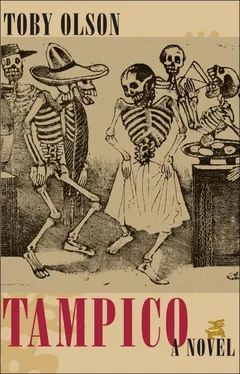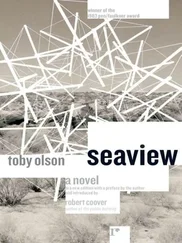For Peter Markman
and in memory of Roberta,
the spirit behind the mask
’Tain’t no sin to take off your skin
and dance around in your bones.
— Song lyric by Edgar Leslie, 1929
Chepa colored the dogs by dipping them in iron cauldrons out back. Estrella was a struggler and almost as large as she was, and Chepa’s arms would be flooding pink fans from the elbows when she lifted her out. Then it was Don Lupe, the spaniel dyed grassy green, and yellow for the Chihuahua, Rata, the only true Mexican of the three.
There was a time when the cauldrons had been used for the scalding of chickens that were fed to the troops, but that was when General Corzo had owned the house, one of many, and before he lost it to Chepa in a game of cards at the Louisian. Chepa had wagered servitude, and it was a good thing for General Corzo that she had won.
The cauldrons rested in a row on the ground below the crude porch, beyond them and Chepa’s small vegetable garden and the oak sapling she’d planted at the garden’s edge the foothills rising above the dusty plains of the state of Tamaulipas, becoming those lush and mysterious mountains from which she had descended, that even from the sky were lost to sight under cloud cover and perpetual mist.
Those perfect circles were my beacon, their colors blinking through drifts of smoke from oil and gas fires, and I’d let the de Havilland take the mountains’ updrafts, bring her into a stall as I banked over the house. Then I could see the derricks and camps off in the distance, a few thin fingers of flame, and the matrix of pipelines, vectors disappearing in the direction of Tampico and the Gulf. I’d dip my wings, and below would be the small figure of Chepa, those bright colorful dots that were the dogs bouncing at her heels as she brought them across the baked clay of the front yard to the edge of our crude landing strip, then paused and looked up to find me.
Maybe a bowl of chili, tamales steaming in corn husks, a cool bottle of sweet Mexican beer. I’d step down from my cockpit, steam rising from the block of ice in the forward one, and Rata in fresh yellow would run and jump at my knee. I could see the breeze in Estrella’s long hair, hear it in the clack of chimes hanging from the porch eaves once the engine had coughed and died, then Chepa’s laughter and the soft clicks in her Indian talk in the dogs’ yapping as she lifted the meal in its stoneware vessel, grinning and cocking her head boldly and not stopping until she was pressing me against the fuselage with her hip and the scent of her cooking was in my nose. It was 1923. Obregón had exempted U.S. oil interests from Article 27 of the constitution. I was twenty years old and Chepa, my Huasteca, was thirty-five.
I hadn’t gone south leaving a dark story behind me, like so many others. I was too young for that. But I had flown the Gulf Coast for Texas Oil all the way from Corpus to Galveston and inland to Hearne and Seguin. It was mail mostly, occasionally executives and small parts, and when Obregón made his move they decided to move me. I had a first week in the city, going over aerial maps of Tamaulipas and Vera Cruz to the south. It was two words then, Vera Cruz, and the maps marked the camps with names — Columbus, Álvara, Aguascalientes — as if they were towns and not just clusters of oil rigs, crescents of barracks and mess halls and a few rooms for bosses and company visitors from the States.
From my hotel window on the second floor I could see down the narrow street into the city’s central square, the corroding church they called a cathedral, public buildings to either side of it, and the flapping awnings and cloth skirts of the various vending carts that lined the perimeters every day. Women leaned over wooden boxes of fruits and vegetables, men in cowboy hats lifted small tools and examined them, a few dusty peons, and away from the shopping, around the bubbling fountain at the square’s center, oilmen in clean shoes bargained and told extended stories. Everything seemed benign in its activity there, but when I held the fan-blown curtains back and followed the drops of sweat falling from my nose to the street below I saw a seamier and more exciting side of things. At least it was that in the eyes of the twenty-year-old I was then.
The Louisian was just across from me, and in the evenings under the gas flares I’d watch women flirting with men in sombreros, some wearing sidearms, on the boardwalk in front of the Café Bolívar a few doors down. It had rained for a solid week before my arrival, and though the street was still mud and I’d watch men dancing across it on narrow boards, the heat was back and the mosquitoes too. The men would slap at them and the women would brush them away, gestures that seemed often in time to the faint strains of Cuban danzón coming from the Lluvia del Oro, the bar Joaquín had told me about, out of sight beyond the Bolívar at the turn.
Joaquín was a Mexican born in Tampico, but he’d been raised up north in McAllen across the border from Reynosa. He had both English and Spanish perfectly and in his early thirties had been hired by Texas Oil. He’d been a kind of advance man, preparing the way for leases and later for payoffs to the various generals and their small armies that provided protection for rig sites. To the south, the aftermath of revolution continued in assassination and uprising, but in Tampico there was yet another enemy, one from the north, and revolution took its form in tribute, a kind of people’s taxes. Joaquín had greeted me at the airport, holding a basket of fruit and smoked fish. It was his job to help me get settled in with the maps and to fly with me until I was oriented, and in the evenings of my first days he took me out into the life of the city streets and to the bars, and one evening had occasion to lean against me and say the following.
“I am told that if holy water falls on her it boils.”
He spoke in a damp whisper, and I could smell the anise on his breath. We were sitting beside each other at the bar overlooking the tables and the small dance floor at the Lluvia del Oro. The French band had finished its set, and people had risen not for dancing now but for drinks and conversation. We’d been talking about the day’s rough landing at a camp called Cerro Azul. The runway had been sabotaged with rocks, and I’d had to make a second pass, then hug the edge. Joaquín had figured it was a warning only. The camp boss had paid the general, but Alcázar hadn’t liked his attitude. Joaquín had spoken to him a few days before, something about a lack of seating for his men and inappropriate dress.
I’d been watching a gathering near the dance floor’s edge as we spoke, three men and a woman sitting across a table from them, and another woman, standing, with hands on her hips, her face in profile, and Joaquín had followed my look, then said those words. It was that profile that had drawn me, something I’d seen in museums.
The men were looking up at her. The one in the middle had a faint smile on his lips. He was leaning back in his chair, medals hanging from his leather vest, hands at rest in his lap. He wore a carefully clipped mustache that drooped at the edges of his mouth, and his hair was thickly oiled and glowed with a dull sheen in the dim bar light. The ones to either side of him wore their hats, fine-looking Stetsons, and though they were watching the woman they glanced to the man in the middle from time to time as if for cues. The woman sitting across from them was weeping. I could see it in the shake of her shoulders and the backs of her arms. Her wrists tapped at the table’s edge, and her head moved from the men to the standing woman. She seemed to be saying something through her sobs.
Читать дальше












